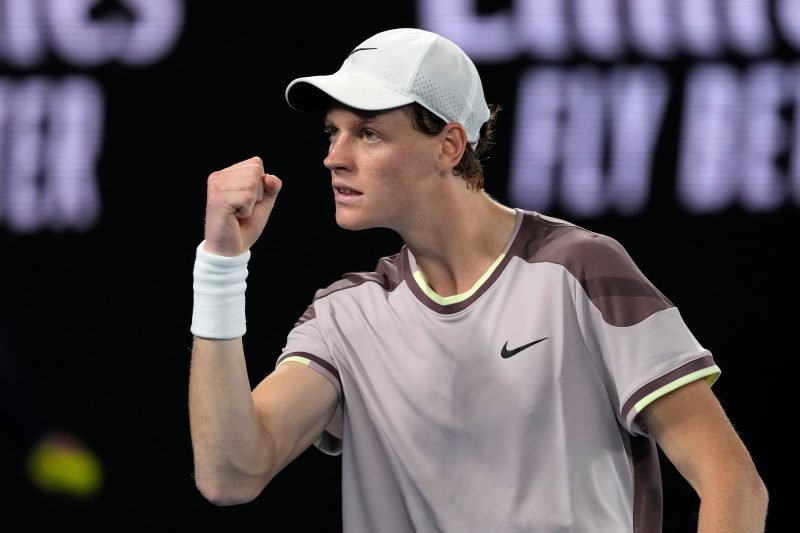
First-time Grand Slam champ establishes himself as legitimate star
The promise of Jannik Sinner wasn’t difficult to see. From the time he started knocking off top players as an 18-year old fresh face on the ATP Tour, the red-headed Italian stood out for his off-the-charts power and fast-twitch athleticism.
And now he’s going to stand out for an entirely different reason: He’s a Grand Slam champion and maybe the best tennis player in the world.
Sinner’s five-set comeback win over Daniil Medvedev in the Australian Open final on Sunday not only makes him the ninth active men’s tennis player to hold a major title, it establishes him as a legitimate superstar positioned to take over the sport alongside his rival Carlos Alcaraz.
Though it took Sinner 3 hours, 44 minutes to finish off Medvedev, 3-6, 3-6, 6-4, 6-4, 6-3, he dominated this tournament from start to finish and has arguably been playing better than anyone since last fall.
After winning titles in Beijing and Vienna, Sinner finished the year taking two out of three matchups against No. 1 Novak Djokovic, including a victory for Italy en route to the Davis Cup title.
Sinner carried that momentum over to Australia, reaching the final by dropping one set and losing his serve just twice. But it was his semifinal victory, beating Djokovic once again in four sets, that that suggested a potential changing of the guard in tennis.
Needing five sets in both the semifinals and quarterfinals − plus another five-setter in the second round − the Russian had spent more than six more hours on court than his opponent. With the possibility that he’d come out with tired legs, the typically patient Medvedev began the final by forcing the issue and trying to shorten points. Behind his big serve, Medvedev made it work and shot out to an early lead.
But the longer the match went, it became clear he was on borrowed time. As Sinner snuck out the third set, then won the fourth after saving crucial break points late in the set, Medvedev’s energy started to run out.
In the end, he spent more than 24 hours and 17 minutes on court − a new Grand Slam record. And for all that effort, it only earned Medvedev a third Australian Open finals defeat. He’s now the only player to lose two Grand Slam finals after leading two sets to love, matching the disappointment he experienced in 2022 at this tournament against Rafael Nadal. Medvedev’s lone major remains the 2021 U.S. Open.
This probably won’t be the last for Sinner, who stands poised at age 22 to be at the top of the sport for a long time.
Though the hype around Sinner exploded at the French Open in 2020 when he reached the quarterfinals and pushed Nadal for two sets, his progress to this point has been pretty methodical.
In 2022, he reached the quarterfinals of three Grand Slams, one of which was a loss to Djokovic at Wimbledon after being up two sets. Then at the U.S. Open that year, he lost to Alcaraz in a five-hour, 15-minute epic that stands as arguably the best match of the decade so far.
Last August, Sinner broke through for his first Masters 1000 title at the Canadian Open and seemed poised for a big run at the U.S. Open. Instead, he suffered from cramps and lost another five-setter to Alexander Zverev in the round of 16, raising some questions about whether he had the endurance to make it through a Grand Slam.
That question was answered in Australia, as Sinner not only passed the physical test against Medvedev but the mental hurdle of beating Djokovic in a best-of-five situation.
Winning his first Grand Slam did not change Sinner’s ranking − he came into the tournament as No. 4 and will leave as No. 4 behind Djokovic, Alcaraz and Medvedev − but it’s fair to say the gap between him and the top tier has been erased.
Those four players have all won a major. You have to go all the way down to Andy Murray No. 49 to find another Grand Slam champion.
Though Djokovic will be No. 1 for the foreseeable future, the one-sided nature of his defeat to Sinner was eye-opening. He was so uncharacteristically flat that even he had difficulty explaining it − potentially the first sign that age is catching up to him as he turns 37 in a few months.
Nobody will be bold enough to write off Djokovic as a contender, but both Sinner and Alcaraz have now beaten him in huge matches over the last seven months at the Australian Open and Wimbledon − his two most successful Grand Slams.
At ages 22 and 20, respectively, they are on the precipice of taking over the sport. With two Slam titles, Alcaraz was already there. After Sinner’s breakthrough win Sunday, the future is now.
